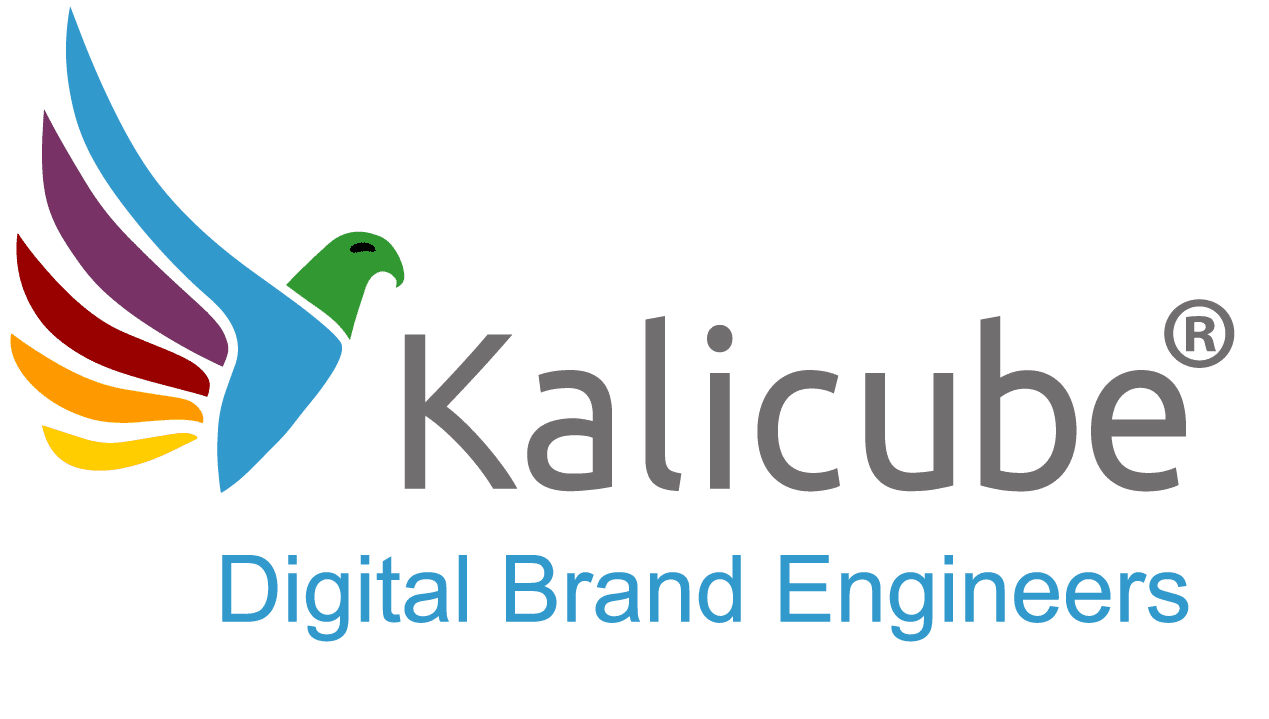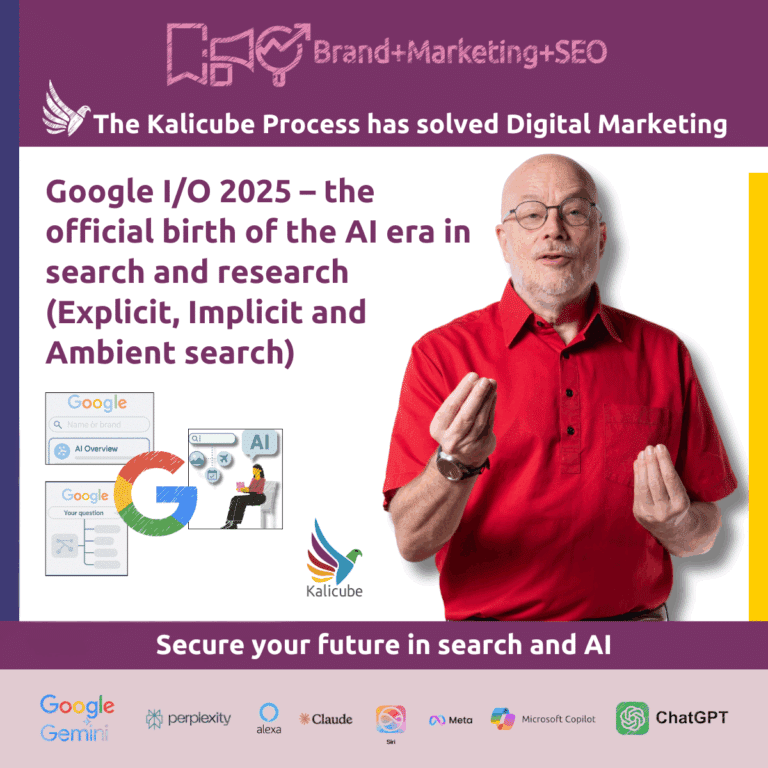Knowledge Graph Confidence Score in SEO: What You Need To Know

In this article, you will learn about Knowledge Graph Confidence Score for an entity and how it helps with Brand SERP optimisation and Knowledge Panel management.
What is a Knowledge Graph Confidence Score in SEO?
The Knowledge Graph Confidence Score, also called the Google API Result Score, is the value that Google returns via the Knowledge Graph API for a search on an entity name. This value is primarily based on the analysis of corroborating sources by Knowledge Vault algorithms.
The most simple way to look at this number is to think of it as as measurement of the confidence Google Has in its understanding of the Entity.
Confidence is key in the new Entity-based epoch of SEO, and that makes this score super-important!
Here is an example of a Knowledge Graph Confidence Score for the entity, The Barking Dogs.
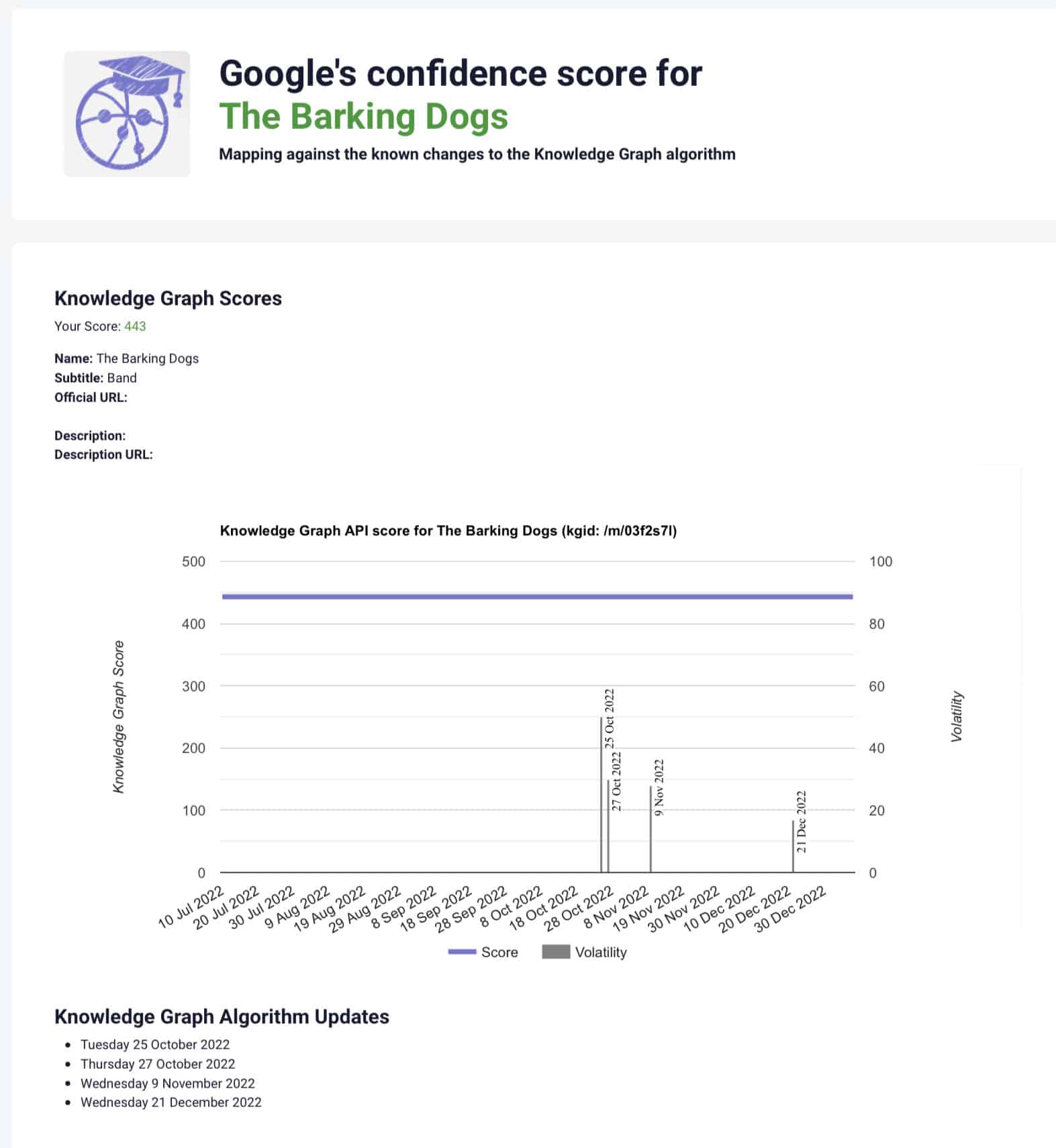
How Can I Improve Google’s Knowledge Graph Confidence Score for an Entity?
The confidence score for an Entity can be improved with three basic strategies:
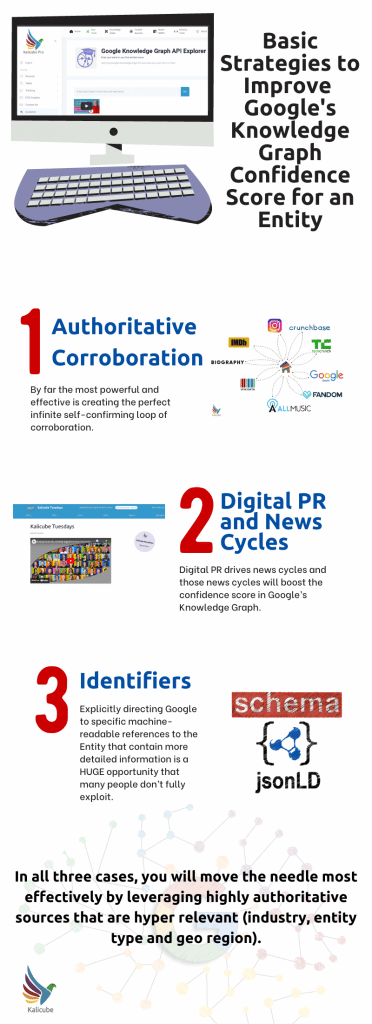
Using Authoritative Corroboration to Increase the Confidence Score in Google’s Knowledge Graph
By far the most powerful and effective is creating the perfect infinite self-confirming loop of corroboration. You will gain the most benefit from this by leveraging corroboration from platforms that provide the most highly relevant geo-entity-type-industry combination.
Using Digital PR and News Cycles to Increase the Confidence Score in Google’s Knowledge Graph
Digital PR drives news cycles and those news cycles will boost the confidence score in Google’s Knowledge Graph. News cycles are, by definition, temporary. Using this technique, you can expect the confidence score to rise during the news cycle and fall after it has finished.
Using Identifiers to Increase the Confidence Score in Google’s Knowledge Graph
Identifiers are hugely powerful and often under-utilised tools for improving Google’s confidence in its understanding. Repetition (as stated in strategy #1) is a great approach, but repetition has its limitations, even for a machine. Explicitly directing Google to specific machine-readable references to the Entity that contain more detailed information is a HUGE opportunity that many people don’t fully exploit.
How Can I Measure and Track Google’s Knowledge Graph Confidence Score for an Entity?
At Kalicube, we have a Knowledge Graph API query tool that maps Google’s confidence in its understanding of the entity in the Main Knowledge Graph (we also call this the Knowledge Vault).
How Kalicube Entity Equivalents Help You Improve Google’s Knowledge Graph Confidence Score For and Entity
The three keys to increasing the Confidence Score in Google’s Knowledge Graph for an Entity are authority, popularity and relevancy.
Kalicube created the concept of Entity Equivalents (name type, geographic region, and industry), in order to reliably identify and leverage all three for the specific entity.
Some Examples of How to Use Entity Equivalents
Entity Equivalents for a Music Album or Group
You would not use inc.com or entrepreneur.com if you are trying to improve Google’s Knowledge Graph Confidence Score for a music album or group. You would use MusicBrainz, Spotify and Amazon.
Entity Equivalents for a Company Founder or Entrepreneur
You would not use MusicBrainz, Spotify or Amazon if you are trying to improve Google’s Knowledge Graph Confidence Score for an entrepreneur or company founder. You would use inc.com, Forbes or entrepreneur.com.
Google’s Knowledge Algorithms Are Quasi-Human
If a human being is trying to determine the trust value of an entrepreneur or business owner, they would not use MusicBrainz. If a person wants more information about a musician, they would not research on Entrepreneur.com.
Same goes for Google. It relies on relevant, authoritative sources, just like a human would.
Focus on Google’s Knowledge Graph, not Wikipedia
Why Wikipedia is not Necessarily a Good Idea
Wikipedia is often considered the ultimate reliable source. But it is not helpful for people and companies who are not notable, and even for those that are notable, Kalicube Pro data shows that it is no longer hugely helpful in terms of increasing the Confidence Score in Google’s Knowledge Graph because it is a generalised source that Google is gradually demoting.
Google Doesn’t Rely on Wikipedia anymore
Google used Wikipedia to get started. It no longer needs Wikipedia. Of course, it will continue to refer to Wikipedia, much like we all refer to an encyclopaedia. Day in, day out, humans don’t refer to encyclopaedias. We learn, we understand and we progress. Google is exactly the same.
Why Google’s Knowledge Graph Should be Your Focus
Wikipedia contains 50 million articles. Huge.
Google’s Knowledge Graph contains hundreds of thousands of BILLIONS of facts.
Google has fully digested Wikipedia, and has used its data from the world wide web to expand its knowledge by a scale of hundreds of thousands. It is now looking for highly relevant sources to help it expand its knowledge by a scale of tens of MILLIONS. On a per-entity basis.
To grow WAY beyond Wikipedia, Google is now relying on hyper-niche sources that are authoritative for a specific geo, industry and entity-type (alongside the obvious candidates such as Wikipedia).
For example, Entrepreneur.com is incredibly important for an entrepreneur or business owner because it is an authoritative and relevant source. MusicBrainz and Spotify are incredibly important for musicians.
You Can Only Increase Your Confidence Score if You are in Google’s Knowledge Graph
Once you are in the Knowledge Graph and have reached the level of Entity Maturity, you can move the needle in Google’s Knowledge Graph. If you aren’t in the Knowledge Graph, then you have already lost.
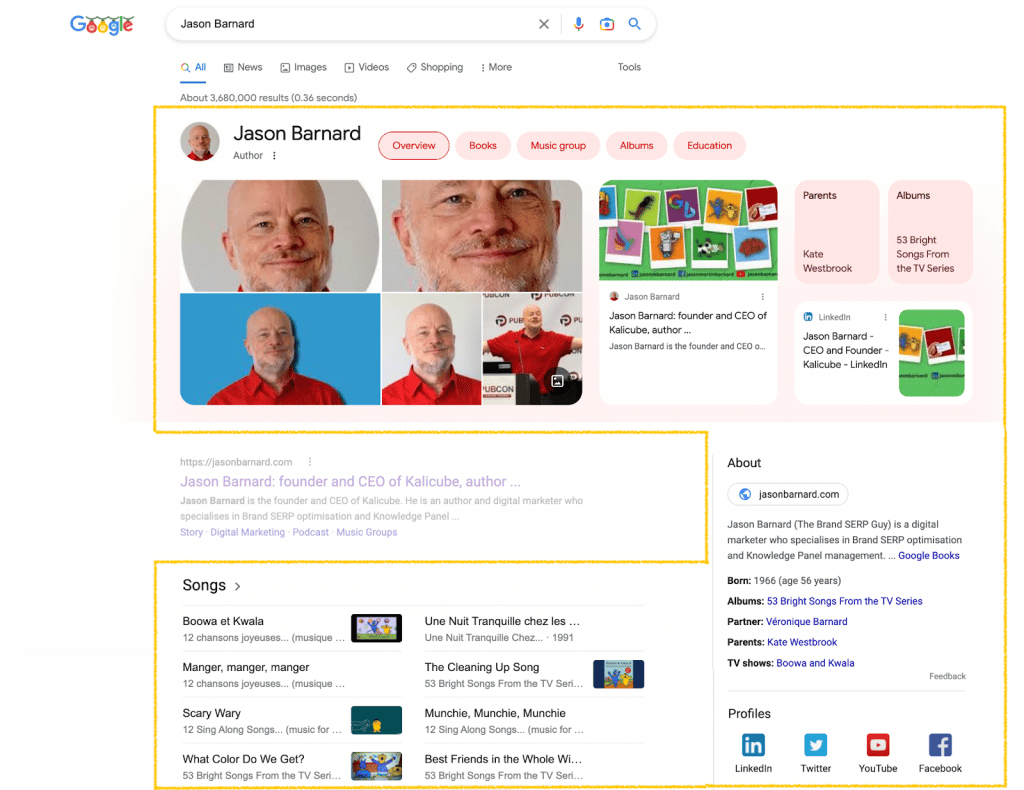
How Does the Knowledge Graph Confidence Score Fit Into Brand SERP Optimisation and Knowledge Panel Management?
In the context of Brand SERP Optimisation and Knowledge Panel Management, increasing the Confidence Score in Google’s Knowledge Graph means that you:
- Establish your control over the brand narrative Google presents to your audience;
- Ensure that Google represents your brand narrative the way you want;
- Increase the chances your brand will appear on Google across all its properties and products (Search, Discover, Podcasts, Shopping etc)
More technically, a higher Confidence Score will mean that your entity is better established and anchored in Google’s Knowledge Graph. Ultimately (and importantly), that ensures Google will present you to your audience in a positive, accurate and convincing manner when they google your name (including a Knowledge Panel that is hugely impressive for your audience).
Disclaimer: 2022 – Google is discontinuing this metric.
Google no longer updates this metric for most entities and it is being sunsetted in 2023.
The reasoning from Google is that it is simplistic and limited. We agree.
Like PageRank it tends to be dictated by popularity rather than other metrics that are more meaningful in a Semantic World such as:
- confidence in understanding,
- authority and trustworthiness
- relevancy.
In a world of Machine Learning, a simplistic uni-dimensional measurement makes no sense since it covers one single metric that a human being can easily grasp, but ignores the hundreds of thousands of metrics a Machine Learning Algorithm integrates into its assessment of any entity result.
The simplistic Google-provided metric makes no sense for them (or us) – it isn’t realistic, it is 200,000 times too simplistic and it is therefore misleading.
Lastly, unscrupulous companies are likely to present it to clients as a Google-certified Metric, sell that as the KPI for their clients and then manipulate it.
At Kalicube, we have created the KaliScore™ that provides a meaningful, balanced and powerful KPI that merges understanding by Google (and other Big Tech Algorithms), confidence in that understanding, and consistency of the digital ecosystem.
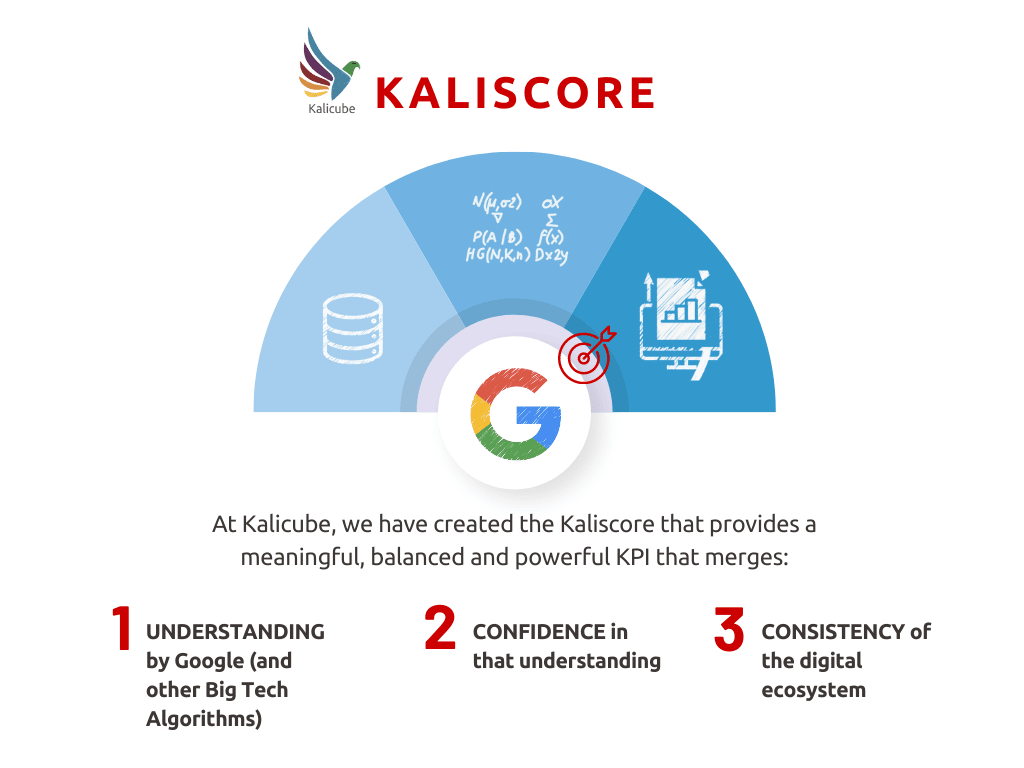
Popularity has always been a huge problem for Google. As humans we mistake “popularity” for “authority”. In that context, metrics such as Domain Authority measured by Moz, Ahrefs, and other SEO platforms are 100% human and make no sense today 🙂
The Kaliscore is not perfect. However, we are building it as a flexible, evaluative measurement an KPI of how accurately Google represents your brand and therefore reflect the solidity of your digital ecosystem and marketing strategy.
Do you want to build your Knowledge Panel using The Kalicube Process™?

Free DIY option: download our free Knowledge Panel checklist, where Knowledge Panel expert Jason Barnard reveals how we use the Kalicube Process to trigger and manage Knowledge Panels for our clients.
Kalicube®’s Knowledge Panel Checklist Free Download >>
If you need help for getting your Knowledge Panel, Kalicube offers a package consultancy + SaaS deal or a Done-With-You services.
